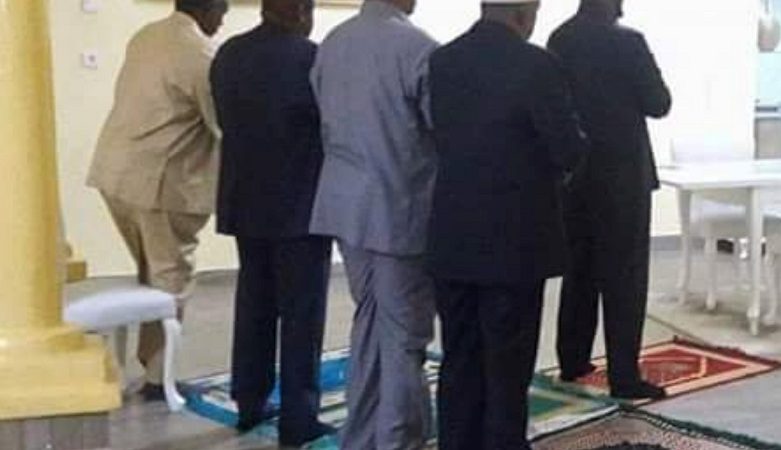
The Somalia Start | | October 01, 2018 – MOGADISHU – In 1998, as part of its constant push to sabotage Somalia’s unity, the Ethiopian government led by the Tigrayan ethnic minority put forward a proposal — it called “building blocks” — to an East African regional bloc, IGAD, to divvy up Somalia into six clan-based regional administrations.
Twenty years later, the UN envoy to Somalia, Michael Keating, declared, in his final briefing to the Security Council this month, “the federal map is being filled in,” the latest being Hirshabelle that was established last year. It’s a “continuation, not quite the completion of state formation process,” he told regional administrators several days earlier in the coastal city of Kismayo.
That history is always purposefully omitted when discussing the Somali federal system that trapped the nation in a vicious circle that only serves the interests of esurient politicians. The UN and the EU — the peddlers and financiers of the system — have dissembled federalism’s debilitating consequences in the country, such as the unremitting wrangling between the central government and regional administrations over power and resources that distracted Somalia from taking its rightful place in the world.
“A united and alert Somalia would have been best positioned to take advantage of the ongoing sociopolitical, sociocultural and socioeconomic changes in the Horn of Africa region,” said somehow wistfully the rector of Somali National University, Mohamed Ahmed Jimale, in an interview with The Somalia Star, urging a “united front,” because, “Somalia needs a strong foreign policy to play an active role in the region and on the world stage.”
Unbeknownst to many Somalis, the Ethiopian proposal to the intergovernmental Authority on Development, or IGAD, was a translation of Addis Ababa’s ages-old vision of one day annexing Somalia to realize Emperor Haile Selassie’s widely published 1956 speech in Qabri-Dahar, a town in the occupied Somali region in Ethiopia, in which he suggested that Somalia should be added to Ethiopia. Curiously, all the envisioned regional administrations have an access to the sea and a land border with the Somali region in Ethiopia.
Unwary Somali politicians — not the wider public — uncritically bought the Ethiopian concept of federalism and wrongly thought it’s good for the country. It’s not unexpected. The system offered greedy regional administrators, who have a taste for expensive cars and five-star hotels, the opportunity they always hankered for: To do as they wish. And so they did. They unilaterally struck trade and military deals with foreign countries and entities. Taking advantage of the ambiguity in the provisional constitution, they went further and forged state-to-state ties with foreign countries. They took delight in meeting with Kenyan Presidents, Ethiopian prime ministers and princes from the United Arab Emirates and Saudi Arabia, among other foreign dignitaries. The European Union has lavished support and praise on them, putting them, on occasion, on a par with President Mohamed Abdullahi Mohamed Farmajo. The EU made the administrators’ presence conditional on holding international conferences on Somalia. They couldn’t be happier. Federalism was too much of an opportunity to pass up for these self-seeking politicians.
New era
But that carte blanche seems to be nearing its end — not because Somalia’s central government has become stronger and stood up to foreign countries’ blatant push to create parallel centers of power in the country. Or that President Farmajo and Prime Minister Hassan Ali Khaire have become more imaginative and adroit politicians. But it’s because the Horn of Africa region has drastically changed in a way no one has ever imagined.
What was easily doable just a few months ago, such as Nairobi’s and Addis Ababa’s meddling in the internal affairs of Somalia has become unacceptable to the region’s leaders. Ethiopia, whose former governments’ preoccupation were to undermine Somalia’s unity is now wooing Mogadishu’s support in midwifing a regional bloc to enhance economic integration. Addis Ababa, the tip of the spear for Somalia’s chaos, is tied up locally trying to avert turmoil in its own backyard, as the inhomogeneous Ethiopians, cobbled together by minority ethnic groups, are at each other’s throats, careering the whole nation toward a state of uncertainty.
The changes in the region — Ethiopia reconciled with Eritrea, which also restored ties with Djibouti and Somalia — are undercutting the forces that benefited from the old order in which Somalia was on the receiving end of all regional conspiracies. The campaign to shatter Somalia into clan-based fiefdoms is on hold, at least for now. As a result, Somalia’s federal states are losing their shine, while the national government is finding its voice and deftly playing its weak hand at the regional level by mediating between Eritrea and Djibouti until they buried the hatchet.
Somalia has always been lucky. It has the longest coastline on mainland Africa. It has — in Keating’s words — “amazing” and “very creative people.” They’re also fearless, entrepreneurs and unflappable. Since 1991, when Ethiopian-backed warlords toppled the last strong central government, Somalis endured a great deal of suffering: Civil wars, two famines, an Ethiopian occupation and foreign-backed terrorism. Yet no country has had Somalia’s stick-to-itiveness to take its calamities in stride.
Ethiopia and Kenya may not have liked a united and strong Somalia, but they got no option but to eat humble pie and accept Somalia as a one unit. It’s not that they’re doing a favor for Somalia. They’ve just realized that if they continue encouraging Somalia’s fragmentation they could soon suffer the same fate, as they’re — unlike Somalia — made up of different ethnic groups.

The winds of change sweeping across the Horn of Africa region didn’t only render the so-called federal member states irrelevant, but it’s also sucked the life out of the Hargeisa administration that since 1991 agitated for secession from the rest of the country. Now the inhabitants of the northwestern Somali region are in a bind. The Ethiopian regime that cosseted them with military and diplomatic support since the early 1980s, when they waged a guerrilla warfare against Somalia’s last central government, is gone. Hargeisa could wait for recognition, some say, until the cows come home, but bonding with Mogadishu will always — as before — be easier and take a shorter period of time.
Jimale, the rector, said the federal system is “leading the country to a cul-de-sac.”
“The disagreement between Mogadishu and regional administrations won’t end until the constitutional review is finalized and powers are clearly defined,” he said. “We were told to adopt a federal system without any rules and regulations to help us navigate through this unfamiliar system.”
Jimale voiced concern over the country’s future, saying foreigners turned it into a “project.” Finance Minister Abdirahman Duale Beyle also once said “Somalia is a project.”
“I don’t blame foreign powers. Because we, Somalis, are the ones who allowed them to use us as a project. No one wants the Somali project to end,” Jimale said. “Until we find leaders who can say ‘enough is enough. This exploitation must end,’ Somalia will be stuck in this problem that was designed to beget more problems.”
Grotesque arrangement
Somalia’s federal system beats logic. The country should have been the last to practice such a mode of governance. Its people are just a one big tribe. There was no urgency that necessitated its imposition. Moreover, federalism came into being in the middle of political, economic and security crises in the country, all crying out for solutions. Instead of fixing them, a new problem setting Somalis against one another was brought up.
Somalis didn’t vote for federalism, nor did it come as a result of a national demand. It’s the result of a smart maneuvering by Ethiopia and Kenya that wanted to dismember Somalia to stop it from reclaiming its lands under their occupation. The European Union and the UN were duped into financing the grotesque arrangement that baffled ordinary Somalis but benefited venal politicians.
The system tried to rewrite and rebrand Somalia, flagrantly distorting Somalis’ centuries-old history of coexistence and reducing it to clan rivalries as if the rivalry has just started the other day. Many Somali academics have questioned the viability of the system, saying it created thousands of unnecessary jobs in a poor nation whose bulk of its budget comes from donors.
The outgoing UN envoy to Somalia, Keaten, appeared to allude to this one-step forward two-step backward situation, in his final briefing to the United Nations Security Council on Sept. 13.
“On the day I’ve arrived in Mogadishu in January 20, 2016, I was taken straight to the president’s office to discuss a threat by federal member states to suspend cooperation with the central government,” he told the council. “When I left Mogadishu two days ago, the country faced a similar situation. The structural problems that shape Somali politics and security have not changed.”
An ailing system
The federal system was doomed from the onset. It bestowed more power and less accountability on the administrators. It’s too defective to function optimally in a nation whose citizens thrived on being as free as a bird and traveled around their lands, unencumbered, to satisfy their nomadic instincts.
The existence of federalism in Somalia, however, demonstrates how far foreign powers can go to reorder the country. While the malignant proposition to break it up was seriously explored, the far better and easier option of uniting it was intentionally ignored, with disastrous consequences for the Horn of Africa nation’s political health and territorial integrity. The whole idea was plain dumb given Somalia’s homogenous nature. The so-called 825-member of National Constituent Assembly that in 2012 approved the provisional constitution, which proposed the system, did so without giving much thought to the document’s content or the greater Somali context — or even the prevailing systems in the world. In Africa, only Nigeria, South Africa and Ethiopia have had federal systems before Somalia, illustrating its unpopularity across the continent and the world at large. Globally, there are only 25 federal countries, including Somalia, which is the only homogeneous nation in the list.
Because of the federalism’s unpopularity in Somalia, the UN and others have spent tens of millions of dollars on TV and radio advertisements and on workshops and meetings to change the Somali public’s unfavorable attitude to toward a system that, in the eyes of many, sought to create a solution where there is no problem. The foreign involvement has raised credible questions about whether the objective behind its imposition was to deepen the country’s problems. For example, what the ailing federal system deceptively claimed to pioneer, such as political inclusivity and equitable sharing of resources, can easily be implemented by a competent central government. If late Mohamed Siyad Barre’s Somalia was a one-man administration, without checks and balances, the country, Somalis say, can avoid his mistakes and build a properly-run central government that ably attends to the needs of all Somalis regardless of whether they’re in Mogadishu or in the most far-flung villages of the republic.
This dichotomy between federalism and centralism came to a head earlier this month, when the country’s five regional administrators — who often stick their feet in their mouths — capriciously announced that they cut ties with the national government because it interfered in the internal affairs of Somali regions. Perhaps all they wanted to say was “we want to be independent States,” some Somalis say.
No one has captured the strong reaction of many Somalis better than lawmaker Zakariye Mahmud Haji Abdi who laughed off the administrators’ move to sever ties with their own government.
“How can someone in his right mind accuse a Somali government of interfering in the internal affairs of its own country. These politicians should keep up with the times,” he said. “The authors of Somalia’s federalism are gone. The Tigrayans who controlled Ethiopia and constantly meddled in our country are gone. That message must sink in.
“Our politicians should know that the people they lead are proud Somalis who want a central government that can provide them with pride, dignity and services,” he said.
Like Ethiopia’s ethnic-based model, the federal system in Somalia is the construct and artwork of the minority ethnic group of Tigrayans who, for decades, dominated Ethiopia until their rule was toppled earlier this year. Since then, Ethiopia, Eritrea, Djibouti and Somalia have been pushing for the de-tigrayanization of the Horn of Africa region, which suffered under the brutal and short-sighted administration of late Tigrayan supremo Meles Zanawi.
Under the Tigrayan leadership, Addis Ababa — and by extension the region — lurched from one crisis to another. Ethiopia fought a bloody war with Eritrea that killed close to 80,000 people on both sides. Economically, Addis Ababa is buckling under the weight of billions of dollars of Chinese debt, forcing new Prime Minister Abiy Ahmed to ask Beijing to give his country more time to repay its debt. Politically, Meles, left behind angry and marginalized Oromos and Amharas, the largest and second largest ethnic groups in the country respectively. An Oromo prime minister, Ahmed, has since taken the helm of the country and started extirpating the old order. The international media has falsely called Meles a “charismatic” leader, even though he sowed the seeds of his own country’s disintegration.
Ethiopian forces had also invaded Somalia and committed war crimes in Mogadishu and elsewhere in the country until Somalis forced them to turn tail after two years of ruinous occupation. Even after that, Addis Ababa had the final say on the election and selection of Somalia’s presidents, prime ministers, ministers and lawmakers — indeed, almost on any influential individual in the country of about 15 million — until lawmakers mad at Ethiopia’s malevolent influence elected President Mohamed Abdullahi Mohamed Farmajo, a quasi-nationalist, as the nation’s president last year.
Somalis and Ethiopians have never ever had good neighborliness. Their relations weren’t based on a foundation that can sustain good friendships. Their relations were poisoned in the 19th century by British colonialists who handed over a whole Somali region to Ethiopia, a decision Somalis always resisted.
Former Ethiopian dictator Mengistu Haile Mariam considered Somalia as his country’s “first and biggest enemy,” said Libya’s former Foreign Minister Abdel Rahman Shalgam earlier this year.
Shalgam, who said he’s Libya’s envoy to East Africa during the Ogaden war in 1977, revealed that Mengistu had always raised with him, in their private conversations, the Somali issue.
“He repeated his solution, which he didn’t back down from it: To partition Somalia – on clan basis,” he wrote in an opinion piece for the pan Arabic newspaper Asharq Al-awsat on April 7 this year.
When Shalgam, a former Libyan ambassador to the United Nations, informed Mengistu about “Libya’s unequivocal opposition to it. Because Somalia is a member of the Arab League,” the Ethiopian foreign ministry declared him a “persona non grata” the next day and ordered him to “leave the country immediately,” he wrote.
The Kismayo powwow
The five administrators’ powwow in Kismayo that ran between Sept. 4 and 8 was a real baroque attempt to delegitimize the national government in Mogadishu in the face of the international community that buttressed the federal system. In a 7-page communiqué, they berated Mogadishu for not empowering them. But they ended up delegitimizing themselves and the system they misused.
There’s scant reason to believe that the regional chiefs’ flagging fortunes would bounce back in the near future. In fact, it becomes increasingly clear that they ran out of ideas. Their failure to deliver or be above reproach has hollowed out their own administrations. Corruption and mismanagement and lacks of accountability are rife in regional administrations from the northeastern city of Garowe to the southern city of Kismayo. These ills and the administrators’ sybaritic lifestyle and blithe disregard for the needs of their poor population have, many say, curdled the federal system more than anything else.
The row between Mogadishu and regional chiefs is likely to linger for sometime. The administrators lack any practical leverage to compel Mogadishu to come to the negotiating table. Prime Minister Hassan Ali Khaire has strongly pooh-poohed the group’s call for a neutral venue and a guarantor, slamming the door in any foreign mediator’s face. There’s also no incentive — political or otherwise — for the national government to climb down and cede an inch to politicians who, after all, have no respect for it.
“I won’t welcome someone to say that a third foreign party should mediate between us,” Khaire said, drawing rapturous applause from an audience in Mogadishu. “A third party mediation is the old culture that said foreigners should mediate between Somali leaders. That’s a bygone era.”
During their meeting in Kismayo, the five administrators — who are loathed and despised by many Somalis — tried to project an image of a united and happy team, but their angry, passive and insecure appearances gave them away. Their joint photo, showing them sitting under a tree and in front of small pieces of watermelon, was so expressive that the crowd of gawkers who gathered around them didn’t need any further explanations. There was no smile, no lively chitchat or even a good posture. They slouched in a 5-dollar plastic chairs, apparently engrossed in thought to even notice their own absurd bearing.
They looked like a mirror image of the country’s predatory warlords who for 15 years carved up the country into clannish enclaves before they were swept out of power in a matter of weeks in 2006, when a group of United Islamic Courts ejected them from the capital, Mogadishu. No one expected that to happen, as the men did America’s bidding and hunted down clerics in exchange for dollars. But when it happened, the country’s political and security trajectories have drastically changed — although not always for the better.
“They’ve lost the plot before they issued their biting statement. You can’t keep blaming the national government on every evil in your neck of the woods,” said Ibrahim Farah Bursalid, an independent analyst and former lecturer of diplomacy and international studies at Kenya’s University of Nairobi. “They’ve to answer the important question before blaming Mogadishu: What have they done for their regions apart from stripping the public of their funds.”
In their statement, the five administrators — Abdiwali Mohamed Ali Gaas of Puntland, Mohamed Abdi Waare of Hirshabelle, Ahmed Mohamed Islam of Jubaland, Ahmed Dua’ale Gelle of Galmudug and Sharif Hassan Sheikh Aden of Southwest — accused the national government of using money to bribe regional assemblies to allegedly incite rebellion and of appointing military officers without consulting regional chiefs.
“This demonstrates that the central government’s top leadership doesn’t believe in the application of federalism,” said the Somali version of their statement.
The regional chiefs, who once basked in the unbridled backing of neighboring countries, have always been their own worst enemies. They got no legacy that can stand the test of a free and fair election. They’re failing and falling sheriffs, some say. Their regions are suffering from all sorts of problems from insecurity to health to abject poverty, ills they vowed to fix when they came to office. The UN envoy, Keaten, who attended the Kismayo gathering, gave them a slap on the wrists when he said the “ultimate test” is to improve the lives of ordinary Somalis.
In his latest gambit to secure re-election, Gaas of Garowe has desperately instigated — as many in the region allege — a war with the northwestern region to convince his region’s inhabitants that he’s a strong man who can wrest more territory from the neighboring region.
Gaas’ move was a part of the regional administrators’ hyperbolic language that did everything to demonize Mogadishu to attract the attention and sympathy of the international community.
“The council expressed concern over the political chaos and breakup Somalia has entered,” the administrators said, referring to their Council of Inter-State Cooperation, or CIC, which they established in Oct. 9, 2017.
As usual, the international media and foreign Somali experts and analysts, whose analyses mostly miss the mark, have begun to speciously portray the spat between Mogadishu and regional administrations as the beginning of the end of a united Somalia.
“Somalia could be split into six regions after five regional federal states announced that they would no longer co-operate with Mogadishu until their grievances about insecurity, sharing of natural resources and the interference by the central government in their affairs are addressed,” read the first paragraph of a story from the Kenyan newspaper, The EastAfrican, titled: “Somalia in a crisis as regions pull away from Mogadishu.”
Warlords’ reincarnation
Somalia’s current crisis, like many others of a similar nature that happened in the country, is superficial and smacks of the tactics used by previous warlords who removed President Barre from power in 1991 and then refused to cooperate with fragile governments that emerged from painstaking negotiations to hold the country for ransom. Like the warlords before them, the regional administrators are anything but harmonious.
Mohamed Abdi Waare of Hirshabelle has already bolted from the club. He said, indirectly admitting his indiscretion, that his region would work with the national government in Mogadishu. Waare’s statement came after at least three deputy chief administrators came out to disown what their superiors said in Kismayo on Sept 8. President Farmajo’s efforts to start a dialogue with regional chiefs within the framework of the National Security Council, of which all the administrators are a part, came to naught after the politicians declined to travel to Mogadishu because, they said, “for security reason,” there must first be an agreement on the venue of the meeting.
Ahmed Dua’ale Gelle of Galmudug has also spurned President Farmajo’s separate invitation for talks about the political situation in the central Somali region.
“Galmudug’s solution doesn’t need a get-together in Mogadishu,” said a statement from Gelle’s office on Sunday.
The administrators may have tried to look every bit the powerful and intransigent former warlords, but they got no real power or support base to protect them from Mogadishu’s determination to consign them, like the warlords, to history, especially when their elections come up. They can try to postpone the vote, but that will surely be met with Mogadishu’s dexterous propaganda, which oft-times depicts them as self-interested politicians with suspicious ties to foreign countries.
Mogadishu knows that if it legally gets rid of these politicians, it can pull off a twofer: It will deal a major blow to federalism-mongers and lend a strategic hand to unionists willing to put Somalia on a glide path toward a strong central government.
A hard lesson to learn from this ever-fresh squabble between Mogadishu and regional chiefs is that it’s a waste of time and resources to impose foreign cultures on Somalia, where each individual — according to Keaten, the UN envoy — is “very fierce.” Somalis’ hearts still lie with the unitary system that held their country together for decades, say many Somalis, even if federalism tries its luck in the the country. Unity seems to boost the Somali ego, while cantonization punctures it.
Many Somalis say that the international community’s pet projects are their pet peeves, arguing that if the federal system is subjected to a referendum, an overwhelming majority of Somalis will outright reject it. During the civil war, warlords reigned supreme in the southern and central regions, giving the impression that Somalis succumbed to their ruthlessness. But when Somalis rose up against the predators, they licked them in a few weeks.
If there’s one thing that is permanent in Somalia, it seems, it’s Somalis’ unpredictability. It appears that Somalis — despite their internal challenges — will always be Somalis, ever untamable and contumacious.
In their recent history, Somalis have either peacefully or violently cast off presidents, warlords and corrupt politicians. Al Shabab terrorists and federalism may not stand a chance too, many Somalis say.
If, in the the 19th century, British colonists handed over two Somali regions to Kenya and Ethiopia, the new enemies of the nation, Somalis argue, are trying to mutilate the rest further through federalism. But now — as then — there’s zilch chance, it seems, of defeating the will of Somalis. After decades of occupation, for instance, Somalis in Ethiopia and Kenya are more pan-Somali than at any time in the past, defying the notion that Somalis’ unity could be weakened by dismemberment.
Still, a new team that looks like British colonial collaborators of yesteryear is boiling the ocean.
Bursalid, the former lecturer, said the seismic changes in Ethiopia has “blown sky-high any hope of further breaking up Somalia into regional states.” He said the politicians, who’re behind the bid to balkanize Somalia, had become “orphans since the new Ethiopia pulled itself away from their orbit.”
“Somalia’s federal system is an idea whose death has come, no matter how long it stays in the ill-equipped intensive care unit of Somalia’s dilapidated hospital, it will eventually breathe its last. No doubt about that,” said Bursalid, who is a visiting lecturer at several Universities in the East African region. “These politicians’ downfall is their own doing. They committed two killer blunders: They bet on foreign support and misgoverned their own people.
“Now, it is incumbent on the national government to seize this opportunity and chart a new course for the country to lead Somalis to unity and prosperity. It’s long past time for Somali leaders to sit down and resolve their differences amicably,” he told The Somalia Star.
.
.
.
.
Xafiiska Wararka Qaranimo Online | Muqdisho
______________________________________________________
_____________________________________________________________________________________
Xafiiska Wararka Qaranimo Online | Mogadishu, Somalia
_____________________________________________________________________________________Advertisement
_____________________________________________________________________________________







